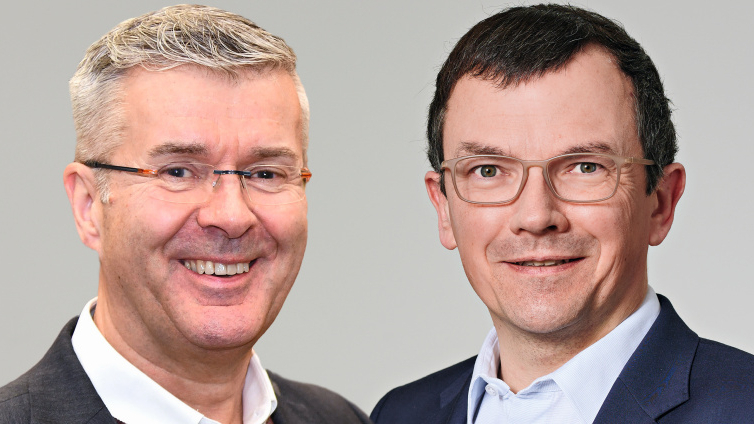Prof. Jens P. Wulfsberg and Peter Müller-Baum Wulfsberg is President of the Scientific Society for Production Technology (WGP), Müller-Baum VDMA Managing Director Power-to-X Interview: Sylke Becker, Robert Piterek "We need more technological openness in mobility"
What about the combustion engine is outdated, what is contemporary?
Prof. Wulfsberg: The physical principle is outdated. The oscillating, moving masses in the engine should be replaced by a simpler principle - the Lorentz force in electric motors. Then there are the noise and emissions that the motor produces. The enormous engineering know-how in research and industry is still up to date. This is our capital for the next steps.
Müller-Baum: In terms of application technology and noise and emissions, I take a similar view. But there are areas, such as shipping, where e-mobility doesn't work. Even in 2050, we will still have to deal with the combustion engine.
Until now, it was said that jobs in Germany depend on the car industry. Why wasn't the combustion engine given more political support?
Müller-Baum: We are probably in the midst of the biggest transformation of industry since the introduction of the steam engine. Anyone who says that e-mobility won't work is arguing like a horse-drawn carriage owner at the beginning of the 19th century who doubted the combustion engine. Battery technology has proven that it can replace the combustion engine in many areas. Other technologies must also be allowed to develop. I am sure that we will be able to use the combustion engine in a climate-neutral way in the future.
Wulfsberg: The two technologies will probably compete with each other. But the question is what we use our resources for. We have to manage the transformation in the shortest possible time. However, hydrogen and renewable energy will remain scarce for some time to come. My aim is therefore to help battery-electric technology achieve a breakthrough. But without banning the combustion engine altogether.
What role does the scarcity of resources play?
Müller-Baum: Green energy is scarce in Germany. That's why e-fuels should be produced where there is an abundance of green energy, e.g. in Africa. From there, e-fuels can be transported all over the world and also to us.
Wulfsberg: We will continue to import energy, the question is in what form. From a technical point of view, the efficiency chain of hydrogen, fuel cell and mechanical energy is better than e-fuels for complex combustion engines. I therefore favor the battery-electric efficiency chain.
Müller-Baum: The efficiency debate is a sham. It's about how much is paid for mobility energy. Green energy from sunny countries can be 20 times or more cheaper than here. In that case, a difference in the efficiency chain is irrelevant. The efficiency chain is not an argument against e-fuels.
Wulfsberg: Users will opt for the better technology anyway and there will always be noise and emissions from a combustion engine.
Should the market decide - without bans?
Müller-Baum: Politicians should not say that we know the best solution and ban others, but should set a framework, e.g. that no moreCO2 is emitted.
Do we have to focus on e-mobility in competition with China and the USA?
Müller-Baum: The Chinese have built up a market for e-mobiles that they no longer have to subsidize. At the same time, they are investing massively in fuel cells. There is no other country with so many power-to-X patents. At the same time, there is a lot of research into combustion engines. That's why we also need more technological openness when it comes to mobility.
Wulfsberg: China can pose a threat to our manufacturers with its production of battery-electric vehicles. Conversely, that means we have to be faster and better. The fact that China is doing a lot of research into the combustion engine does not mean that we have to do the same. I would concentrate our efforts on electromobility and fuel cells.
INFO
Prof. Jens P. Wulfsberg and Peter Müller-Baum
discussed the future of mobility in the podcast "Internal combustion engine: Why not?" as part of the "Tech Affair - Industry for Future" series. Although the legal situation provides for a ban on the combustion engine by 2035, the use of e-fuels as a fuel could still be permitted. The podcast series is offered by the German Machine Tool Builders' Association (VDW). Podcast at: https://bit.ly/3F7ZSbi


